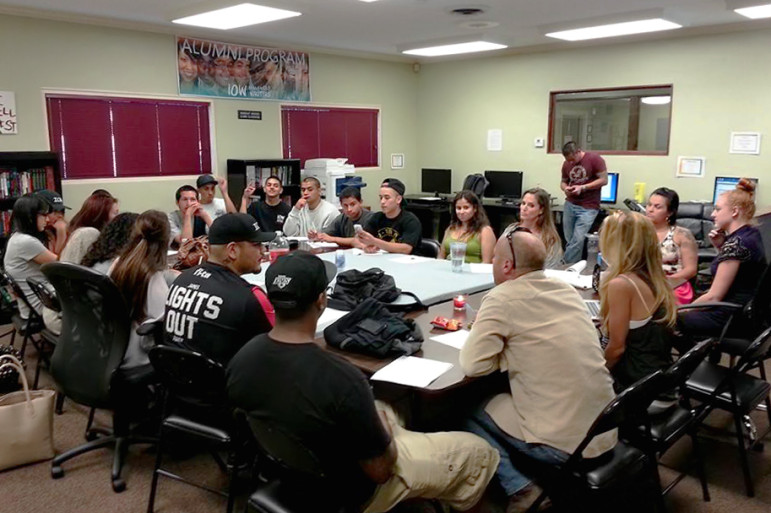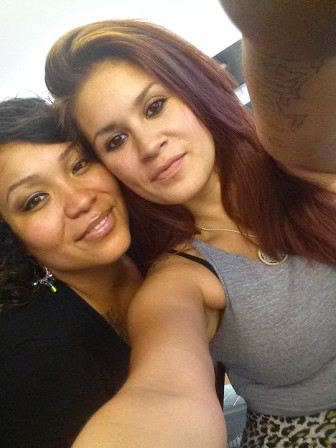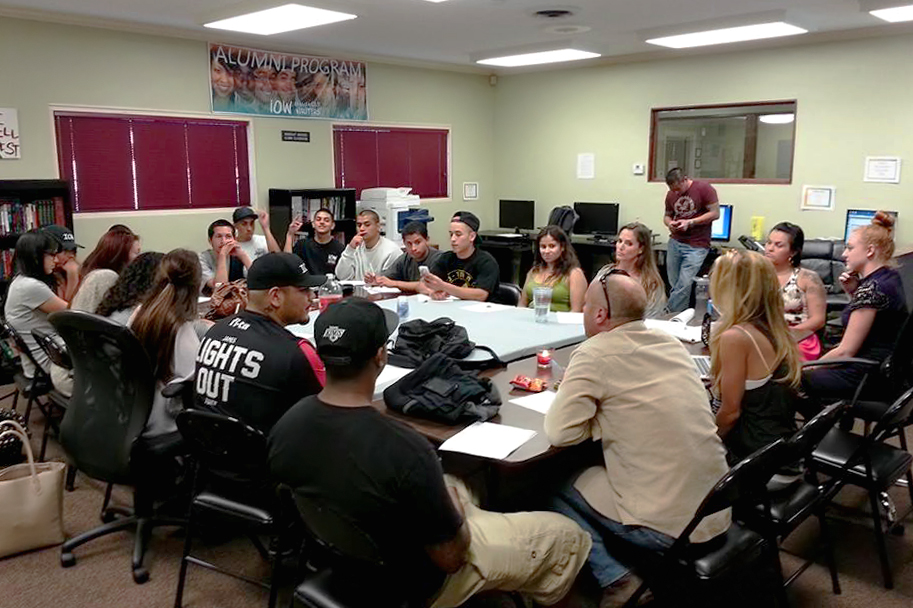
InsideOUT Writers
InsideOUT Writers alums and guests talk with co-teachers Todd Rubenstein (yellow shirt at front corner of table) and Susy Sobel (far right of photo with hand on chin) in June 2014. Rubenstein is also the chairman of the board of directors.
The boys at the table in the Juvenile Hall in Los Angeles are tense. Teacher Johnny Kovatch doesn’t hold back, aggressively pushing them to write more and dig deeper inside themselves.
Their first writing prompt is the word “pressure.” A student begins to rap: “I regret giving into the pressure, when I should have been sitting in lectures.”
The youth is ready to admit his mistakes. He is ready to move on, away from a life of crime. It’s heart-warming. Chills follow, though, as he notes he’s just at the start of a 13-year sentence. Nobody is in the classroom just for the good feelings.
The idea of walking into a juvenile correctional facility and teaching rehabilitative creative writing can sound a bit alarming.
Since 1996, IOW has been visiting incarcerated youth across Los Angeles County, using the written word to help inmates build self-confidence and trust in each other. The classes offer the students a chance to escape the oppression of detention by expressing their emotions in a way many never have before. The goal is to end recidivism.
My introduction to InsideOut Writers came several years ago through my cousin, Todd Rubenstein. Todd’s a guy who always seems to have something good going on, so when he told me about this amazing program he worked with [NOTE: Todd Rubenstein is chairman of the board of directors.], the news didn’t surprise me.
I began by attending an IOW alumni class. Former incarcerated students attend weekly writing circles where they reflect on their time in lockup and since. I was inspired by how open they were. Their stories of redemption left me feeling blissfully moved.
Now I had the opportunity to see the full operation and attend classes behind bars.
LA’s Central Juvenile Hall for an all-girl class is my first stop. Signs about the importance of education hang on IOW office walls. The words of Victor Hugo say it best, “He who opens a door to a school, closes a prison.”
As veteran IOW teacher Susan Cuscuna walks in, girls’ faces light up and they begin hugging her. Cuscuna makes the rounds, taking a moment for each one.

Jaki Murillo
Alumni of InsideOUT Writers: Cristal Contreras (left) and Jaki Murillo. Former incarcerated students often attend the weekly writing circles where they reflect on their time in lockup and since.
At the end of the table one teen sits sobbing, eyes swollen and red. She thought she was getting released today. As Cuscuna turns towards her, a smile begins to grow. “I’ve missed you,” she cries out.
Even before class, I notice something special about Cuscuna and all IOW teachers: care for students outside their work, genuine and sometimes tough loving concern.
Each class follows a very similar lesson plan. Students are given multiple writing prompts, then asked to share their work and both receive and provide feedback from the circle.
One by one the students begin to open up with each other, thinking about their lives, while working through understanding their emotions and actions. Building self-trust lies at the root of every piece of writing.
“We need to change the way these girls think about themselves, let them understand they are worth something, before we can begin to change their behavior,” Cuscuna told me.
One student proclaims she sees future encounters with law enforcement when she leaves the facility, suggesting trouble just always seems to find her.
The oldest student in the circle barks a response: She says she’s here because “I didn’t take control of my life … you have to take control of your life, don’t let someone else … I’m here because I didn’t know it then, now I do.”
The room goes silent when she says, “They gave me chances, and I regret not taking them.”
Some students are reluctant, claiming they have nothing positive to contribute. But each time the class begs them to read and their words leave the listeners elated. Each classmate is praised. Slowly the reader begins to realize she matters to someone, but most importantly to themselves.
“Everything that is good in life is hard,” Cuscuna tells her students.
At 9 a.m. the next day, another IOW teacher, Scott Budnick, brings me into his all-boy class, most in for violent crimes. He has taught IOW classes every Saturday morning since 2003. With him that day are two other teachers, Johnny Kovatch and Susy Sobel. The three create a perfect balance of caring nurture and hard-knock love.
Kovatch bounces around the table, pouring out energy and enthusiasm, while Budnick and Sobel bring it all together.
The teachers emphasize the students must express the talent and effort the teachers knew they’re capable of. The atmosphere begins to get aggressive. Unlike the girls’ class the day before, the boys don’t like opening up about their feelings.
But the teachers are ready to make them dig.
“Sometimes I feel that I’ve been a failure so long I can’t succeed, but I know I have to let that pressure out, and not hold it in,” one student says. Each student uses the writing circle to look inside themselves at the decisions and emotions that set them off-course.
Budnick asks the students to share something they got out of the day. Most say the classes give them a chance to vent. One boy says, “Writing makes me not want to care about the bad things anymore,” while another insists, “Writing makes me believe in myself, knowing I can do it!”
As the students leave, the teachers begin discussing which ones contributed and which did not, ultimately cutting a few from the following session. I was a tad shocked at first, but then realized IOW is a privilege for these boys, not a right.

